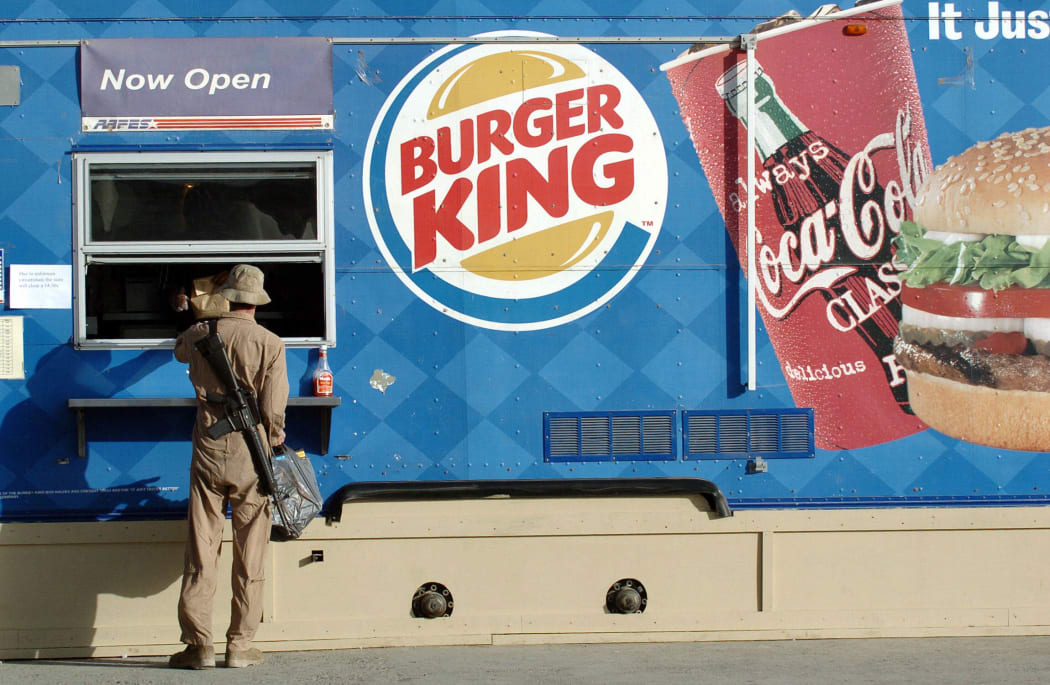Twenty years after the US invaded Afghanistan in pursuit of Al Qaeda, it suddenly pulled its troops out this week. It’s the end of the longest war in modern history in which 3500 New Zealanders also served and 10 died. Will it be out of sight and out of mind for the media now Afghanistan is on its own again?

A US soldier passes an order at a Burger King shop in Bagram air base on 4 October 2004. Photo: AFP / Emmanuel Dunand
US forces abandoned eight bases in Afghanistan last weekend, including their HQ at Bagram, so swiftly that looters descended on them faster than the Afghan forces who were supposed to take over.
US President Biden announced back in May that US-led NATO forces would fully withdraw from Afghanistan by September 11 this year - exactly 20 years on from the Twin Towers atrocity that led them there in the first place in pursuit of Al Qaeda and the Taliban. New Zealand’s last remaining personnel left later that month.
But not even their Afghan allies were told the US troops would be leaving earlier than planned this week, leaving behind thousands of vehicles, tonnes of supplies and garbage.
It echoed the chaotic evacuation of the US embassy in Saigon in 1975 when North Vietnamese forces poised to overrun the capital of what was then South Vietnam.
While that brought down the curtain on just over 10 years of war for the US and their allies, the war they launched in 2001 in Afghanistan has lasted almost twice as long.
Back in May this year veteran BBC correspondent Lyse Doucet sat down with America’s longest serving commander in Afghanistan, General Scott Miller and asked him if they were preparing to abandon Afghanistan to civil war.
“There were victories on the way... but we'll need to take a really honest look at the things we did not do as well as we wanted to," General Miller replied.
“There’s many nations with many service members that have spent a great deal of time in Afghanistan - and if you ask then what they would like as an outcome they would like to see this country come back together and end the decades of violence,“ he said.
After Tuesday’s ‘Bagram bail-out’, the US commander-in-chief who made that call told reporters he didn't want any questions about it during the 4 July holiday weekend - only about “happy things".
Meanwhile reporters in Afghanistan have been reporting on the Taliban taking over more territory - among them the BBC’s Lyse Doucet who said resistance to the Taliban was “crumbling” in some places.
Just last week she wrote for the BBC website that the vibe in Kabul felt like early 1989 when occupying Soviet forces were preparing to quit after almost nine years of fruitless warfare.
Those developments led RNZ’s Worldwatch bulletins earlier this week, and the US withdrawal was reported by TVNZ1 News and Newshub at 6 on Tuesday.
Defence Minister Peeni Henare was quoted as saying New Zealand is “keeping a close eye on the situation unfolding in Afghanistan.”
But his comments amounted to just six seconds in RNZ’s news bulletins on Tuesday., while National's Foreign Affairs spokesperson Gerry Brownlee got a 15 second soundbite in RNZ’s news when he said what's happening there was “extremely disappointing".
Considering all the years New Zealand contributed to the International Security Assistance Force, it is surprising how little media interest there is in the war being folded up right now after 20 years.
More than 3500 NZDF personnel deployed to Afghanistan after 2001 and the commitment cost around $300 million.
Journalists Jon Stephenson and Nicky Hager revealed a raid called Operation Burnham that sparked a long-running inquiry into civilian deaths and the conduct of the NZSAS.
The media was also misled by the NZDF over the deadly Battle of Baghak - and Jon Stephenson sued for defamation when the Defence Force claimed he made up parts of his reports on conduct of some SAS troops.
Also there are about 3500 people of Afghan origin living here in New Zealand (including some of the refugees from the Tampa ship who were huge news back in 2001) and some people who worked with the NZDF in Afghanistan whose lives were endangered by the association.
President Biden told reporters this week Afghans who helped the US military “are not going to be left behind” and his administration had stepped up plans to evacuate thousands of people.
On Thursday, the Sydney Morning Herald reported that at least 100 Afghans who worked with Australia’s forces and diplomats are waiting for their visas.
Foreign Minister Marise Payne confirmed Afghan subcontractors who weren't directly employed by the Australian Government are not eligible for ‘special protection’ visas. The Labor opposition spokesperson said the Taliban "don't care if the person who has helped Australia has helped them as a direct employee or as an employee of a contractor."
This weekend former Minister of Defence Wayne Mapp told TVNZ’s Q+A the international effort failed to build a secure nation after toppling the Taliban.
“The nation-building proved to be a task that was beyond the capability of the coalition,” he said.
“The commitment to replace conflict with peace will always be remembered,” Prime Minister Jacinda Ardern said in February when she confirmed our last soldiers would be coming home in May.
As the Taliban create conflict in more areas that had some peace, it remains to be seen if the world’s media - including ours - are committed to remembering Afghanistan now that US-led forces are out.


